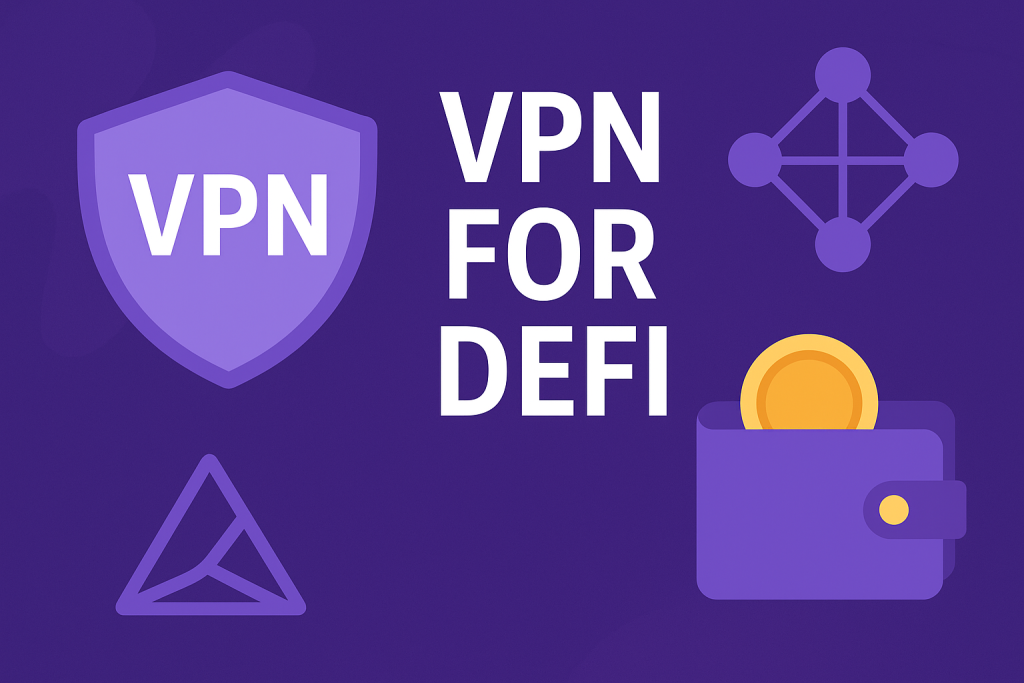Decentralized Finance (DeFi) has revolutionized how we think about money, trading, and financial independence. From staking tokens and yield farming to lending crypto and participating in DAO governance, DeFi offers unprecedented control to users. But that control comes with risk.
Every transaction, wallet connection, or protocol interaction happens in an environment that’s transparent by design. Anyone can see your wallet history, DeFi positions, and even trace your interactions back to an identifiable IP. In a space where privacy equals security, that’s a serious concern.
This is why VPNs (Virtual Private Networks) have quietly become an essential tool for DeFi users not as an optional accessory, but as a fundamental privacy layer for protecting wallets, maintaining anonymity, and bypassing regional access barriers.
Let’s explore why a VPN for DeFi matters, how it enhances both security and accessibility, and why PureVPN is a reliable partner for DeFi participants worldwide.

Understanding the Need for VPNs in the DeFi Ecosystem
DeFi protocols live on public blockchains like Ethereum, Arbitrum, or Solana, which means your transactions are transparent. While this transparency is core to blockchain’s ethos, it also makes wallet behavior trackable. Combine that with IP logs, browser fingerprints, and KYC-linked accounts, and your so-called anonymous identity starts to dissolve.
Here’s what’s at stake:
- IP linkage: Your IP address can reveal your location every time you connect to a dApp or aggregator.
- Regional restrictions: Some DeFi platforms block users from countries with strict regulations (like the U.S., Canada, or China).
- Phishing and man-in-the-middle attacks: Connecting to DeFi platforms on unsecured public Wi-Fi exposes your traffic to interception.
- Centralized monitoring: Even without direct KYC, exchanges and analytics firms often map user behavior across wallets and IP patterns.
That’s where a VPN steps in encrypting your traffic, masking your IP, and making it technically impossible for outsiders to correlate your network identity with your blockchain activity.
What Exactly Does a VPN Do for DeFi Users?
Think of a VPN as a shield between your wallet and the internet. When you connect through a VPN, your data is routed through an encrypted tunnel to a remote server. Instead of your ISP or network showing your real IP, DeFi protocols see the VPN server’s IP instead.
Here’s how it benefits your DeFi experience:
- Privacy Protection:
DeFi platforms can’t associate your IP with your wallet or device, making tracking nearly impossible. This keeps your yield-farming or trading activity private. - Access Unrestricted Protocols:
Many decentralized apps block access based on IP regions due to compliance reasons. With a VPN, you can switch your digital location and regain access to otherwise restricted platforms. - Safe Public Network Usage:
Whether you’re checking DeFi positions in a café or connecting via hotel Wi-Fi, your wallet traffic remains encrypted and invisible to potential attackers. - Consistent Cross-Border Operations:
If you manage liquidity pools or trading bots across different countries, a VPN ensures a consistent IP environment, reducing errors or rate-limit bans.
PureVPN: The Ideal Privacy Tool for DeFi Enthusiasts
Not all VPNs are designed for crypto use. Free VPNs often log your traffic, inject trackers, or even sell connection data to advertisers defeating the entire purpose of anonymity.
PureVPN, on the other hand, is built around a strict no-log, audit-verified policy, making it one of the few VPNs DeFi users can genuinely trust.
Here’s what makes PureVPN stand out:
- No-Log Certified by Independent Auditors
PureVPN has undergone multiple third-party audits that confirm it doesn’t log user activity or metadata. For DeFi users, this means zero risk of your IP or activity ever being exposed. - Wide Global Server Coverage
With over 6,000+ servers in 65+ countries, you can easily route through regions that allow access to your preferred DeFi protocols or decentralized exchanges (DEXs). - High-Speed Performance for Real-Time Trading
DeFi trading requires low latency especially when interacting with automated market makers (AMMs). PureVPN uses high-speed protocols like WireGuard to ensure stable connections and minimal delay. - Advanced Leak Protection
DNS and IPv6 leaks can silently expose your real IP even when connected to a VPN. PureVPN’s built-in leak protection ensures your connection remains airtight during DeFi transactions. - Dedicated IP for DeFi Consistency
Shared IPs can sometimes cause verification issues on Web3 gateways or custodial bridges. PureVPN’s dedicated IP offers a clean, consistent identity across sessions ideal for professional traders and liquidity managers.
Step-by-Step: How to Use a VPN for DeFi Safely
Setting up a VPN for DeFi doesn’t require deep technical skills — just a few smart steps:
- Install PureVPN on Your Device:
Download the app for your OS (Windows, macOS, iOS, Android, or Linux) and log in using your account credentials. - Select a Server Region That Supports Your Target Platform:
For example, if a protocol blocks access from the U.S., connect to a PureVPN server in a crypto-friendly region like Singapore, Switzerland, or the Netherlands. - Enable Kill Switch and Leak Protection:
This ensures your internet instantly disconnects if the VPN drops preventing accidental exposure of your real IP while transacting. - Open Your Wallet or dApp Interface:
Launch MetaMask, Rabby, or any Web3 browser after the VPN connection is active. This ensures your wallet handshake uses the masked IP. - Check Connection Before Transactions:
Use IP verification tools to confirm your new location before interacting with DeFi smart contracts or exchanges. - Maintain Consistency for On-Chain Interactions:
Stick to one region for your DeFi accounts frequent location changes can flag suspicious patterns during analytics scans or airdrop eligibility checks.
Why DeFi Without a VPN Is Riskier Than You Think
The open nature of blockchains makes them transparent and that’s both a feature and a flaw.
For instance, when you interact with a DEX, you might assume it’s “just code,” but your connection still passes through nodes and API endpoints that log IPs and metadata.
Without a VPN, anyone monitoring network flows your ISP, analytics companies, or even hackers on public networks can build a behavioral fingerprint of your crypto activity.
Worse, some regions (like the EU or U.S.) now require exchanges and liquidity platforms to comply with travel rule data collection, meaning IP-level tracking could eventually tie into identity disclosure. A VPN helps keep your financial freedom intact by making your network presence invisible to such oversight.
How VPN Encryption Complements DeFi Security
While blockchain ensures transaction integrity, it doesn’t ensure network-level privacy. That’s where VPN encryption comes in.
| Security Layer | Blockchain | VPN |
|---|---|---|
| Data Encryption | Encrypts transactions | Encrypts all network traffic |
| Identity | Pseudonymous wallet | Masked IP identity |
| Attack Resistance | Protects on-chain data | Blocks network-based attacks |
| Compliance Risk | Visible by region | Hides geographic source |
| Connection Logs | Public blockchain | Zero-log (with PureVPN) |
The combination of these two decentralized finance + encrypted access forms a full-spectrum privacy model that keeps both your assets and your digital presence safe.
Final Thoughts: DeFi Freedom Demands Network Privacy
DeFi is more than a trend; it’s the future of global finance. But with great autonomy comes great responsibility especially around privacy and compliance.
VPNs bridge the gap between your on-chain transparency and off-chain anonymity, ensuring your network activity can’t be exploited, censored, or traced.
With PureVPN, DeFi users can explore new yield opportunities, access region-restricted protocols, and protect wallet identities from unwanted surveillance all while enjoying audited, zero-log protection.
If decentralization represents freedom, then VPNs represent the digital privacy that keeps that freedom intact.
Frequently Asked Questions
Yes. Using a VPN for DeFi is legal in most jurisdictions. It’s primarily a privacy tool, not a circumvention method. However, always review local crypto regulations and DeFi terms of service before accessing restricted platforms.
Absolutely. A VPN encrypts your traffic and hides your IP, making it nearly impossible for attackers to intercept wallet connections or track your activities through public networks.
A VPN might slightly reroute traffic, but with fast protocols like WireGuard, the speed impact is minimal. PureVPN ensures low-latency connections suitable for DeFi interactions, DEX trading, and oracle queries.
Yes, especially when connecting to dApps, bridging assets, or signing smart contracts. Keeping your VPN active ensures all requests remain encrypted and anonymous throughout your session.








